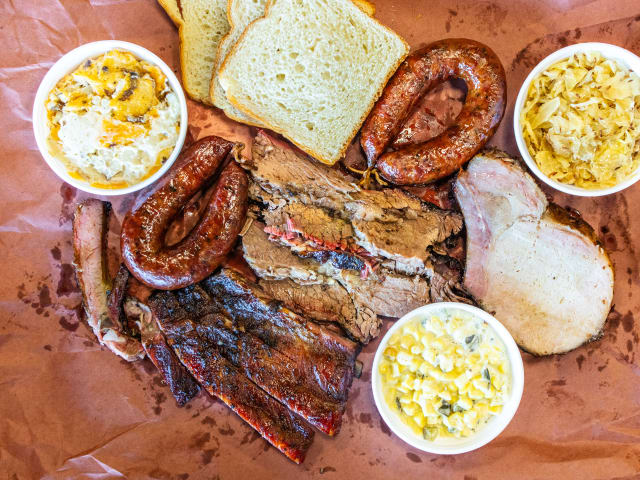Kreuz Market
Landmark serving sausage & BBQ without sauce or forks
Landmark serving sausage & BBQ without sauce or forks

























"“I love Kreuz Market. It’s not actually in Austin city limits—it's in Lockhart, which is about 40 minutes away, but it's well worth the drive. I used to go there with my family after church. It's over a hundred years old. You get your butcher paper, they throw a slab of meat on there, you get a Big Red out of the cooler, and you have a nice meal." - nicolai mccrary

"Central Texas barbecue traditions can largely be attributed to German and Czech butchers who immigrated to the state in the mid-1800s. So it makes sense that a German market that’s been smoking meat for more than a century would be a barbecue institution. The pits at Kreuz Market look like they haven’t been cold in a hundred years, and the pork chops are so moist and tender you can tear off a piece with just a fork. Once your meat is sliced and served on a paper-lined tray, you can head into the dining room where there are tons of large tables to spread out, plus a separate counter where you can grab some sides and a few bottles of Shiner. The sides here also stand out—you should definitely get some creamed corn with poblanos and baked potato casserole, or lean into the German roots and get a side of fennel-seed-flecked sauerkraut." - anne cruz

"Coming down 183 into Lockhart you'll see Kreuz Market on your right; the business traces back to 1900 though it's been in its current building only since 1999 after Rick Schmidt moved it following a family dispute. You place your meat order at the back among the brick pits, and there are no barbecue sauce or forks—it's old-school; say hi to pitmaster Roy Perez with his iconic mutton-chop sideburns on your way out. Expect weekend lines (avoid peak lunch hours or arrive earlier), and order the shoulder clod (the lean-brisket equivalent), a pork chop, both types of homemade sausage, and pork ribs for a solid meal." - Eater Staff

"Central Texas barbecue traditions can largely be attributed to German and Czech butchers who immigrated to the state in the mid-1800s. So it makes sense that a German market that’s been smoking meat for more than a century would be a barbecue institution. The pits at Kreuz Market look like they haven’t been cold in a hundred years, and the pork chops are so moist and tender you can tear off a piece with just a fork. Once your meat is sliced and served on a paper-lined tray, you can head into the dining room where there are tons of large tables to spread out, plus a separate counter where you can grab some sides and a few bottles of Shiner. The sides here also stand out—you should definitely get some creamed corn with poblanos and baked potato casserole, or lean into the German roots and get a side of fennel-seed-flecked sauerkraut. " - anne cruz

"Central Texas barbecue traditions can largely be attributed to German and Czech butchers who immigrated to the state in the mid-1800s. So it makes sense that a German market that’s been smoking meat since 1900 would be a barbecue institution. The pits at Kreuz Market look like they haven’t been cold in a hundred years, and the pork chops are so moist and tender you can tear off a piece with just a fork. Once your meat is sliced and served on a paper-lined tray, you can head into the dining room where there are tons of large tables to spread out, plus a separate counter where you can grab some sides and a few bottles of Shiner. The sides here also stand out—you should definitely get some creamed corn with poblanos and baked potato casserole, or lean into the German roots and get a side of fennel-seed-flecked sauerkraut." - Anne Cruz
